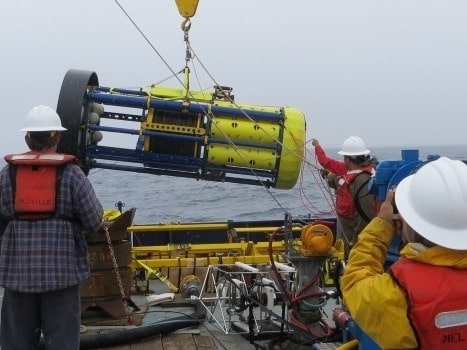As World Oceans Day arrives, Dalhousie scientists introduce new climate monitoring tool

 Scientists at Dalhousie University in Halifax have developed a new tool for determining the impacts of climate change on the world’s oceans. Just in time for World Oceans Day.
Scientists at Dalhousie University in Halifax have developed a new tool for determining the impacts of climate change on the world’s oceans. Just in time for World Oceans Day.
Deployed in the Labrador Sea between the Labrador peninsula and Greenland in an area dubbed one of the “lungs of the ocean,” the SeaCycler oceanographic mooring system will study the air-sea gas exchange and convection currents within the Labrador Sea, providing valuable feedback on the cycling of heat and carbon dioxide throughout the oceans.
“The data are being sent back to Dalhousie via satellite and will allow us to gain a better understanding of how a warming climate may be impacting this region,” says Doug Wallace, Canada Excellence Research Chair in Ocean Science and Technology at Dalhousie and lead investigator on the SeaCycler project, a collaborative effort between Dalhousie, the Department of Fisheries and Oceans and the Scripps Institution of Oceanography in San Diego, California.
Today marks World Oceans Day around the globe. The result of a Canadian proposal at the Rio Earth Summit in 1992, this year’s focus is on Healthy Oceans, Healthy Planet with an emphasis on the damage caused by plastic pollution in the oceans. “Plastic pollution is a serious threat because it degrades very slowly, polluting waterways for a very long time,” says the UN press release. “In addition, plastic pollution impacts the health of aquatic animals because animals including zooplankton mistake the microbeads for food.”
With the United States government having introduced the Microbead-Free Waters Act last December requiring cosmetic companies to phase out the use of microbeads – tiny plastic beads found in an array of products including cosmetics, toothpastes and sandblasting materials- by the year 2017, environmental advocates are now calling on European governments to follow suit- and to up the ante, as well.
“At Greenpeace our main issue with [Obama’s ban] is that it covers only wash-off products, whereas we would like a ban here to cover any products that contain microplastics that go down the drain,” says Greg Norman, press officer for Greenpeace U.K. “So we and our partners are pushing for something more wide-ranging from the U.K. government.”
Ocean advocates recently submitted a petition signed by hundreds of thousands of U.K. citizens urging their government to ban the use of microbeads in consumer products. “The public outcry for a ban on microbeads is unprecedented,” says Rosie Rogers, senior political advisor with Greenpeace UK. “Our own polling has shown that the public is overwhelmingly behind any action that would stop our everyday skincare products or toothpastes inadvertently polluting the ocean.”
The Canadian parliament unanimously voted last year to ban microbeads in consumer products, with the legislation currently under consultation.
More than eight-million tonnes of plastic end up in the ocean every year, according to a World Economic Forum report released earlier this year. With the production of plastics worldwide set to double over the next 20 years, plastic leakage into the oceans by current rates will entail that by 2050 there will be more plastic by weight in the world’s oceans than fish.

